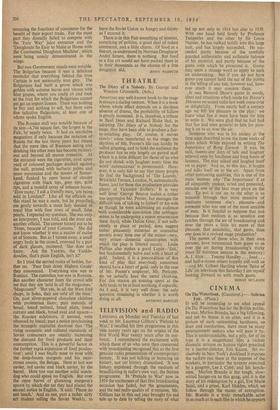TELEVISION and RADIO LISTENING on Monday and Tuesday of last
week to Mr. Laurence Gilliam's 'Prelude to War,' I recalled his first programme in this vein twenty years ago on the origins of the first World War twenty years after its out- break. I remembered the excitement with which those of us who were then concerned with broadcasting recognised this as the first genuine radio presentation of contemporary history. It was not talking or lecturing on history, nor yet history dramatised. It was history expressed through the medium of broadcasting in radio's own way, the feature programme. In 'Prelude to War' now in 1954 the excitement of that first broadcasting occasion has faded, but the genuineness, and the real radio quality of it remains. Mr. Gilliam has in this sad year brought his sad tale up to date by telling the story of what led up not only to 1914 but also to 1939. With one hand held firmly by Professor Temperley and the other by Sir Lewis Namier, he has walked boldly into this large task, and has largely succeeded. He suc- ceeded partly because of the carefully guarded authenticity and authentic balance of his material, and partly because of the gusto with which he presented it. Gusto may seem a strange word to apply to such an undertaking. But if you do not have gusto you cannot hold the ear of the public in the telling of any tale, however sad, how- ever much it may concern them. It was Bernard Shaw's gusto in words, ideas and situations which made his Doctor's Dilemma on sound radio last week come over so delightfully. From nearly half a century ago we felt his pleasure in the play; we knew what fun it must have been for him to write it. We were glad that he had had that fun and were grateful to him for pass- ing it on to us over the air.
Someone who was in his society at the time once described to me the three weeks of gusto which Wilde enjoyed in writing The Importance of Being Earnest It was, he said, twenty-one days of 'talk and laughter relieved only by luncheon and long bouts of laziness. The play talked and laughed itself on to paper. And so, to this day, it laughs and talks itself on to the air. Apart from other entrancing qualities, this is one of the main reasons why 'The Importance' if at all adequately spoken, acted and presented, remains one of the best stage plays on the air. To put it out on to the ether is to transmit through that most sensitive of mediums someone else's pleasure--and someone who was one of the most amiable of men. Is it fanciful to suppose that just because that medium is so sensitive one catches through the air of broadcasting and over the years a little bit more of that pleasure, that amiability, that gusto, than one does in a revived stage production? The names of those who, in their own persons, have transmitted their gusto to us over the air during broadcasting's thirty years bf existence remain in the memory: A. J. Alan. .. Tommy Handley ... Joad and half-a-dozen others happily still with us —and Mr. Gilbert Harding whose 'Spice of Life' on television this Saturday I am myself looking forward to with much gusto.
MORAY MCLAREN


































 Previous page
Previous page